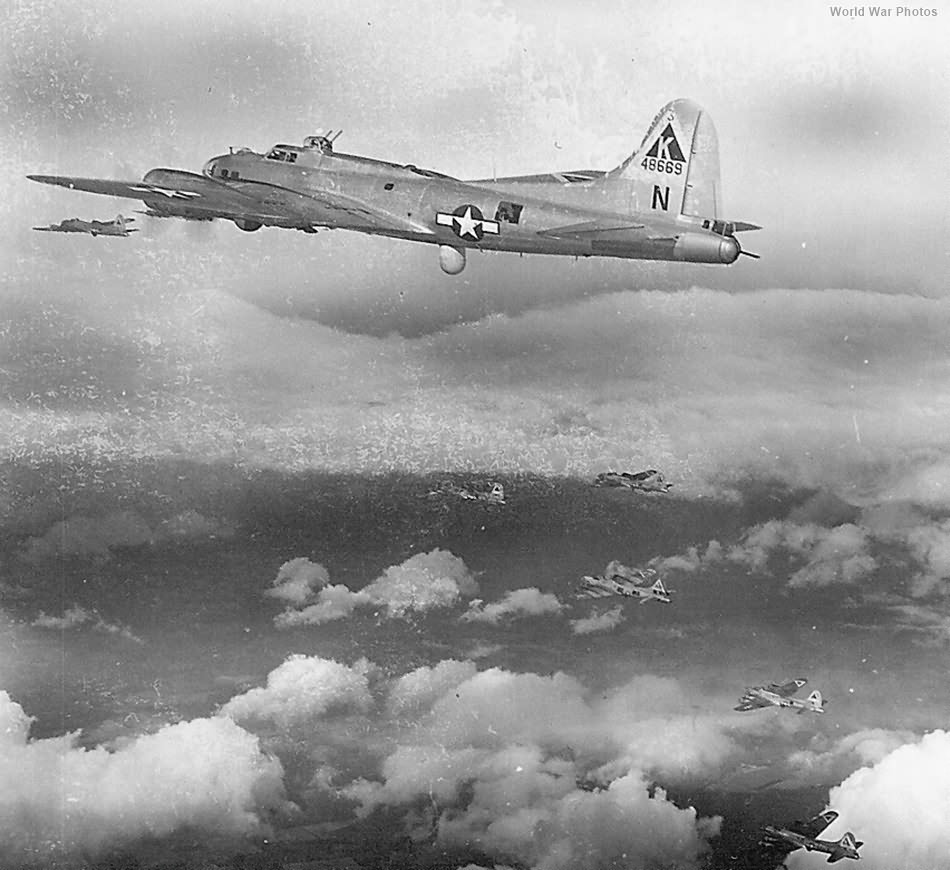379th Bomb Group (H)
Overview:
- Assigned to Eighth Air Force (8th AF): April 1943
- Primary Aircraft: B-17F and B-17G Flying Fortresses.
- Component Squadrons: 524th, 525th, 526th, and 527th Bombardment Squadrons (H).
Wing & Command Assignments:
- VIII Bomber Command (BC), 1st Bombardment Wing (BW), 103rd Provisional Combat Bombardment Wing (PCBW): May 1943
- VIII BC, 1st Bombardment Division (BD), 41st Combat Bombardment Wing (CBW): September 13, 1943
- 1st BD, 41st CBW: January 8, 1944
- 1st Air Division (AD), 41st CBW: January 1, 1945
Stations:
- Kimbolton: May 20, 1943 – June 12, 1945
- (Air echelon at Bovingdon: April 24, 1943 – May 21, 1943)
Group Commanding Officers:
- Col. Maurice A. Preston: November 26, 1942 – October 10, 1944
- Col. Lewis E. Lyle: October 11, 1944 – May 5, 1945
- Lt. Col. Lloyd C. Mason: May 6, 1945 – May 22, 1945
- Lt. Col. Horace E. Frink: May 23, 1945 – June 25, 1945
Combat Record:
- First Mission: May 29, 1943
- Last Mission: April 25, 1945
- Total Missions: 330
- Total Credit Sorties: 10,492
- Total Bomb Tonnage Dropped: 26,459.6 tons (including 43 tons of leaflets)
- Aircraft MIA (Missing in Action): 141
- Enemy Aircraft Claims: 249 destroyed, 57 probable, 135 damaged
Major Awards:
- Two Distinguished Unit Citations (DUC):
- May 28, 1943 – July 31, 1944: For overall operations during this period.
- January 11, 1944: Awarded to all 1st Bombardment Division groups.
Claims to Fame:
- Flew more sorties than any other bomb group in the 8th AF.
- Dropped a greater bomb tonnage than any other group.
- Achieved the lowest abortive rate of any group in action from 1943.
- Pioneered the 12-plane formation that became Standard Operating Procedure (SOP) during 1944.
- “Ol Gappy,” a B-17G, flew 157 missions—likely the most of any aircraft in the 8th AF.
Early History:
- Activated: November 26, 1942, at Gowen Field, Idaho.
- Group Assembled: Wendover Field, Utah, December 2, 1942, training there until March 2, 1943.
- Relocations:
- Sioux City AAB, Iowa: February 3, 1943.
- Final Processing: Camp Douglas, Wisconsin, then to Camp Shanks, New York.
- Departure: Ground echelon sailed aboard the Aquitania on May 10, 1943, arriving in Clyde on May 18, 1943.
- Air Echelon: Departed Sioux City on April 9, 1943, traveling via Bangor, Maine, Kearney, Nebraska, and Selfridge, Michigan, before commencing overseas movement on April 15, 1943, by the North Atlantic ferry route.
Subsequent History:
- Transport Mission: Scheduled to transport U.S. troops from Europe to Casablanca in early June 1945. The mission was not required, and the aircraft were flown back to the U.S.
- Inactivation: The group was inactivated in Casablanca on July 25, 1945.
Aircraft Markings and Identification:
- B-17F/G Fortresses (May 1943 – July 1945):
- Early aircraft were painted in Dark Olive Drab and Neutral Gray factory finishes.
- Squadron codes and radio call-letters were painted in light gray (Sky), with 36-inch-high letters.
- Squadron Code Combinations:
- 524th BS: WA
- 525th BS: FR
- 526th BS: LF
- 527th BS: FO
- Triangle K Group Marking: Introduced in late June 1943, with the code letter repositioned under the tail number. The marking was white on black, with a 24-inch yellow surround applied to both the tail and the wing.
Unique Features:
- Markings evolved to improve visibility and identification, especially with the transition to bare metal B-17Gs, where black was used for codes and the Triangle K markings were made more prominent.
